When mothers of young children ask for advice about how they should be teaching their toddlers and preschoolers, my answer is always the same: play. I’ve curated a list of 5 Steps to increase Important Play, so parents can create an ideal environment in which their children will flourish through play. The importance of play cannot be overstated. Some parents are confused about the nature of play and learning. They mistakenly believe those as two separate entities. In fact, children learn best through play. That’s how they experiment, practice and master skills. Every single second of a child’s play is an important learning experience. Just because it’s fun doesn’t mean it’s not educational. The best preschools are always play-based, because they actively engage a child’s brain, heart and spirit while learning.
Long before a single worksheet is sent home to be completed, children are experts at homework.
I call it Important Play.
It never ceases to amaze me how children instinctively practice new skills tirelessly until they are mastered. They crave learning and are natural experts at getting the job done. Just watch them on a playground. See how they master a new piece of climbing equipment, and immediately repeat that same climb for an hour straight. Up and down, up and down to perfection. They never quit. Or watch them learn how to play games with other children and eschew all their favorite slides, swings, and climbs just to practice being a part of a group.
It is breathtaking to behold their vibrant learning.
It never fails.
After a trip to the zoo, Max and Jack break out the toy animals they had ignored for a month. After a harrowing traffic jam, the imaginary roads running on every wooden floor in our house are clogged with frustrated drivers. After watching mama cook in the kitchen, they add mix, and stir the various components on their plates making their own recipes. In fact, because I do a lot of food photography for Mamaguru, I frequently see them arrange toy food on a plate and take snapshots of it with their own cameras.
It’s hilarious, but it is also important work they are doing.
Important Play actively reinforces of all the facts and skills they are learning. Through play, they make connections, demonstrate knowledge, and build upon previous concepts. Their imaginations and creativity are sparked and seem to explode with every new experience. Those are benchmarks every teacher strives for her students to achieve.
How to Increase your Child’s Important Play
1. Follow the Child
This phrase is the tenant of Maria Montessori’s groundbreaking educational philosophy. Important Play is a natural phenomenon all children have within them. Allow your child to follow his natural interests. Let him get absorbed and obsessed with whatever he finds fascinating, and go along for the ride.
Try not to balance him out. Time will take care of creating well-rounded personalities. It is best to give your child full license to explore and master the world at his own pace.
2. Provide a Variety of Simple Toys
Avoid toys that need batteries or only preform single functions. Those do not support active exploration or Important Play. Blocks, dress-up, dolls, toy food, animals, puppets, instruments, balls and art supplies can be used in a variety of situations, many of which we parents can’t imagine on our own. Children interact creatively with simple toys. Having a wide variety of toys that isn’t gender-limiting allows children to play with the new ideas forming in their growing brains.
3. Make Field-Trips a Way of Life
The best kind of learning is always an act of discovery. Take your child out in the world as often as you can. This can be as simple as your own backyard or as dramatic as the opera. Most communities have a variety of cultural events and activities available to children and families for free. You just have to do your research and use your imagination. No aquarium nearby? Stop by the pet store and gaze at their fish tanks. Think outside of the box.
[clickToTweet tweet=”The best kind of learning is always an act of discovery.” quote=”The best kind of learning is always an act of discovery.”]
I will never forget the two months Max and Jack acted out the Tiger and the Brahman after seeing a free ballet at the library. Every evening after their bath, they would put on just their pajama bottoms (like the dancers) and criss-cross our living room with out-stretched arms and dramatic leaps. They were only one and two years old at the time. Early this summer, I saw they rapidly digging through their straddled legs at the beach. As I reminded them not to throw sand, they explained that they were mama sea turtles laying their eggs, referencing something they experienced i our play group. The more experiences you can share with your child, the richer his or her life will be.
[clickToTweet tweet=”Make field trips a way of life. The more experiences you can share with your child, the richer his/ her life will be.” quote=”Make field trips a way of life. The more experiences you can share with your child, the richer his or her life will be.”]
4. Provide a Constant Supply of Art Supplies
Let your child create works of art that showcase his new understandings. You may not even need to encourage this, but by creating an open shelf with art supplies, your child is invited to create abstract images of new information (another key benchmark). After going to a dinosaur exhibit in the morning, a child with access to crayons and paper is likely to draw a T-Rex in the afternoon. Translating real life experience into abstract art is such an amazing developmental leap.
5. Visit the Library at Least Twice a Month (Weekly is Ideal)
Get a library card and use it to support your child’s growing interests. Not only is this more economical than constantly purchasing books, it also teaches your child that there is an endless supply of fascinating information that is always available to him. If you buy books for your child’s every interest, you will certainly grow broke or frustrated because the whims of a child change quickly (usually right after a $100 amazon order arrives). Plus, visits to your local library help your child develop relationships with librarians who are experts at finding just the right book. It also introduces children to the way communities work.
An Example of Important Play
After the first day of kindergarten, Max came home, had a snack and immediately got to work. He gathered supplies to create a project and put them on a little table. Next, he tore papers from his own little notebook, one for each classmate. He was frustrated not to know their names, because he wanted to write each name on its own paper. His teacher is Mrs. Peacock, so he wrote her a message.
This charming activity shows him making sense of a new experience and figuring out how he and all the new people he met fit together. That is important work for him.
It is Important Play.
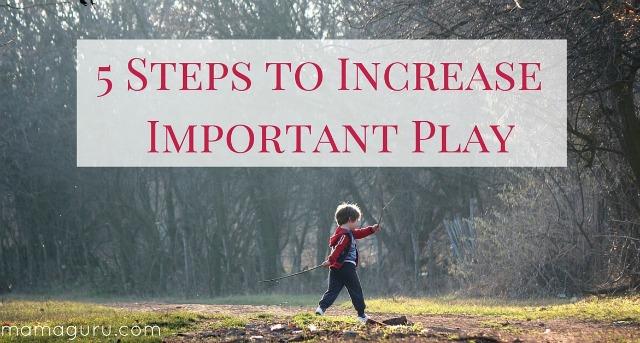
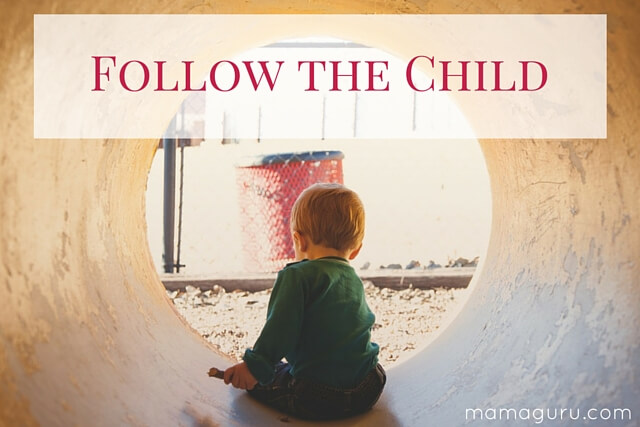
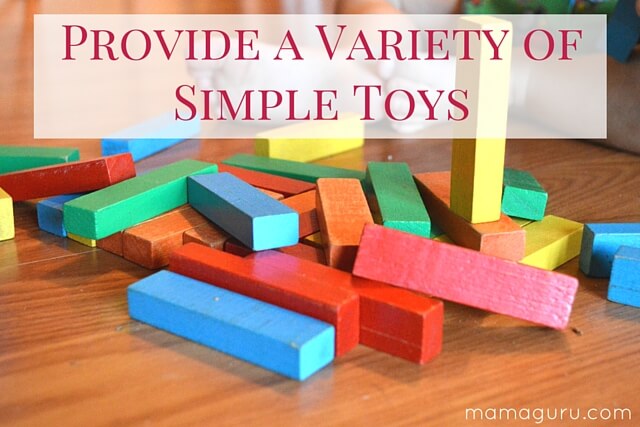

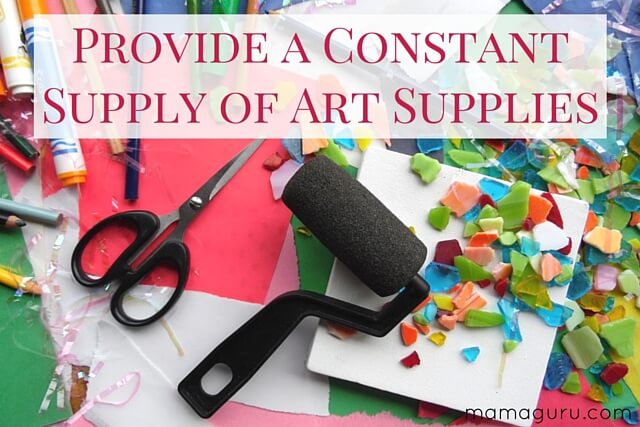

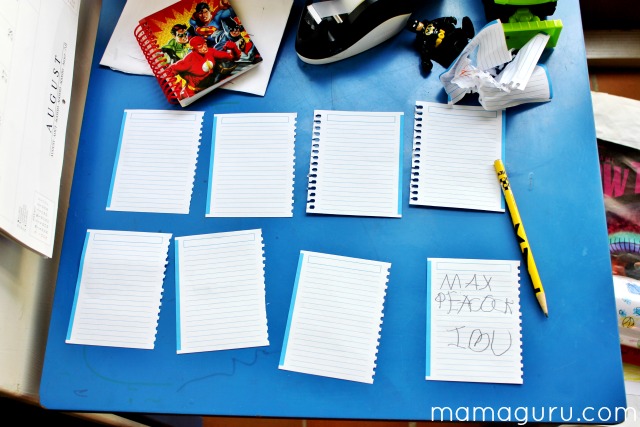
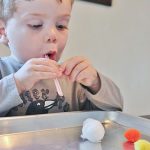


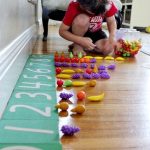


Thank you for sharing these great ideas! I love the idea of going back to basics and getting away from electronics!
These are all great tips! I especially love #2. I strive to find good toys that aren’t plastic, battery operated, light up things without function! Thanks so much for sharing this!
These are such a great idea, I just started my first year of homeschooling and needed to read these, thanks so much!
This is a great compilation of ideas and activities. Both of my boys would love these ideas, especially the younger one who hasn’t gotten much 1 on 1 activity time.
This post came at the perfect time. As my oldest gets ready to go back to school, I am collecting ideas for the little one. I saved these ideas – they are going to come in handy. Thanks!
Going on trips I feel is key! Every weekend I am sure to take my son out and get him seeing things and educating him on the area we live in. Great post!
As a homeschooling mom of 16yrs, I couldn’t agree more. We went to the library weekly and made life a part of learning. We went on field trips to the most unusual places. Local businesses and factories. The younger ages were the most fun, but my last one is 17 and will be a senior this coming year. It’s still fun, but in different ways.